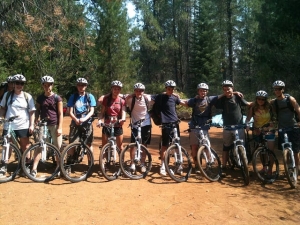Will our Kids Be Able to Communicate?
At a break at a camp conference in Boulder last week, I looked out from the second floor at over 100 camp directors in the lobby below. Virtually everyone was gazing into their smart phones completely disengaged from their peers. It wasn’t that way even three years ago…And this was right after a session where we discussed how camp was an anecdote for an overly wired world! There is hardly a more gregarious, convivial or collegial group of professionals than camp directors, and I figured if our networking was taking a back seat to the pressing siren song of electronic multitasking, then the rest of the world has gone even farther down this road.
Watching recent Super Bowl ads, one would be convinced that technology will be the savior of our society. And while I love many of the benefits of technology, especially when it empowers people, I also see a huge downside to our obsession with a wired world. Technological innovation will always outpace the research on its effects, but research data is beginning to show that despite the benefits, the connected life our kids now lead comes at a real cost to children’s physical and psychological health. It’s also affecting the real world skills our kids are learning.
“Texting especially for teens has become a substitute for direct, live conversation in a way unlike any other medium in history.” Says psychologist Catherine Steiner – Adair, author of, The Big Disconnect, One of the WSJ’s picks for the most important reads in 2013. “Yet learning how to communicate is one of life’s greatest challenges and gifts,” she writes. “The capacity to know and then communicate what you are feeling and thinking when someone else has different thoughts and feelings and you are both upset, is a core life skill. And it’s one our teens are no longer getting. Texting eliminates empathy, how to express yourself clearly and respectfully, how to respond to body language and tone and how to listen to another.”
We can’t argue that losing our ability to communicate effectively is something that can be sacrificed for the benefits and convenience tech offers. The market is telling us differently. Employers (Google, Apple, Microsoft and Dell to name a few) are screaming for employees who possess outstanding communication skills. I researched five different studies (National Association of Colleges and Employers, University of Kent, Monster Jobs, Quint Careers, and American Association of Colleges) and all placed verbal communication (and teamwork) as two of the top five skills employers are looking for in successful job applicants. The more time our kids are removed from opportunities to build skills in face to face communication and direct personal interaction, the less likely it is that our kids will develop the strong communication and teamwork skills needed for success.
This certainly makes the case to take debate in school. It also makes a compelling case for Adventure Treks. We are your partner in giving your kids an exciting alternative to technology. We are successful because outdoor activities are one of the few things that can be even more fun than technology! Like technology, we bring excitement, immediacy, and help kids build identity and independence – all things adolescents need – but at the same time, we are enhancing communication and teamwork skills – the same skills employers are screaming for! A three-week immersion in the outdoors, where things can sometimes be unpredictable and challenging, provides an environment that facilitates the development of real communication and teamwork skills. Equally important is the fact that the Adventure Treks experience is able to give our students a unique perspective on their technology. When students thrive without technology and spend three weeks solely in situations which demand face to face interaction, they grow immensely. They discover that while tech still has an important place in their world; it can simply become a tool rather than a dominating force.
As parents it’s up to us to ask what values and interpersonal skills we want our children to possess as adults. It’s our job to adjust our family’s lifestyle to emphasize these values. It’s easy to live in denial, but there are long term costs (…and benefits too) to our family’s love and use of technology. Our job as parents is to evaluate the consequences and look for ways to provide the best potential outcomes. My household is no different than most, I’ll come home from work to four kids completely submerged in their digital screens. I’m counting the weeks until my kids can go to Adventure Treks and Camp Pinnacle and take a digital break. At “Camp,” the electronics they “need” so much in their day to day will not even be missed!
– John Dockendorf
Executive Director




